That’s it, you chose to embark on the adventure to become a professional diver and take a PADI Divemaster course! My name is Arthur and I want to tell you the story of my Divemaster Training. I will start this article by briefly explaining my situation and my motivations.
What led me to follow a Divemaster Course ?
This is an interesting first question ! I am in a rather special case of Divemaster course because I needed to follow an internship abroad, as part of my engineering training in France. This internship objectives were to discover a foreign culture, different ways to work abroad and finally to improve my English. And I had the total freedom of choice for the location and the domain. Having passed in France a Level 1 (equivalent to the PADI Open Water Diver) five years ago, I realized that I loved this experience and that I would like to renew it. This is how I looked for an internship in a diving center in Bali. After various exchanges with Yann (the manager and instructor) and Blaise (his partner), they proposed me to get my Divemaster course in parallel with my internship.
I immediately accepted and got prepared for this amazing experience.
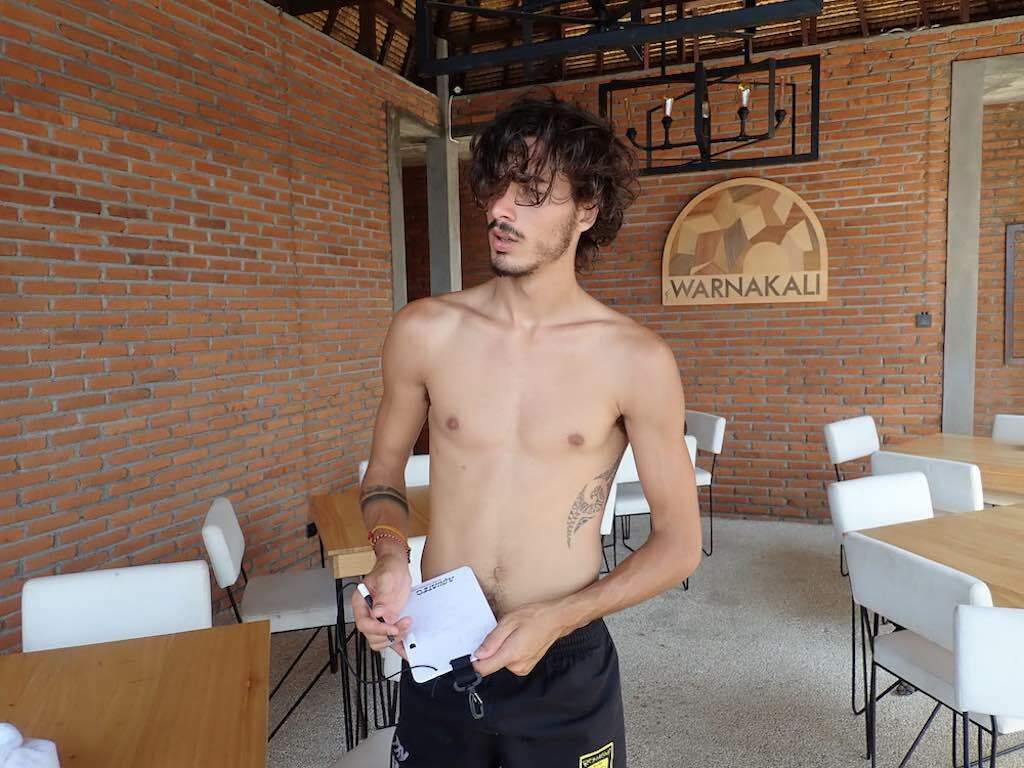
First day at Dune Penida dive center
As soon as I arrived in Nusa Penida, I went to Dune Penida diving center to meet Yann, who will be my mentor, and to see the places. I discovered someone passionate about diving and eager to teach it. It’s very simple: during the first hours, we only spoke about the Divemaster training, not at all about my internship or the work I will have to provide! I quickly discovered the premises with the infinity pool and the awesome view.
At this exact moment, I knew I could not have made a better choice for an internship.
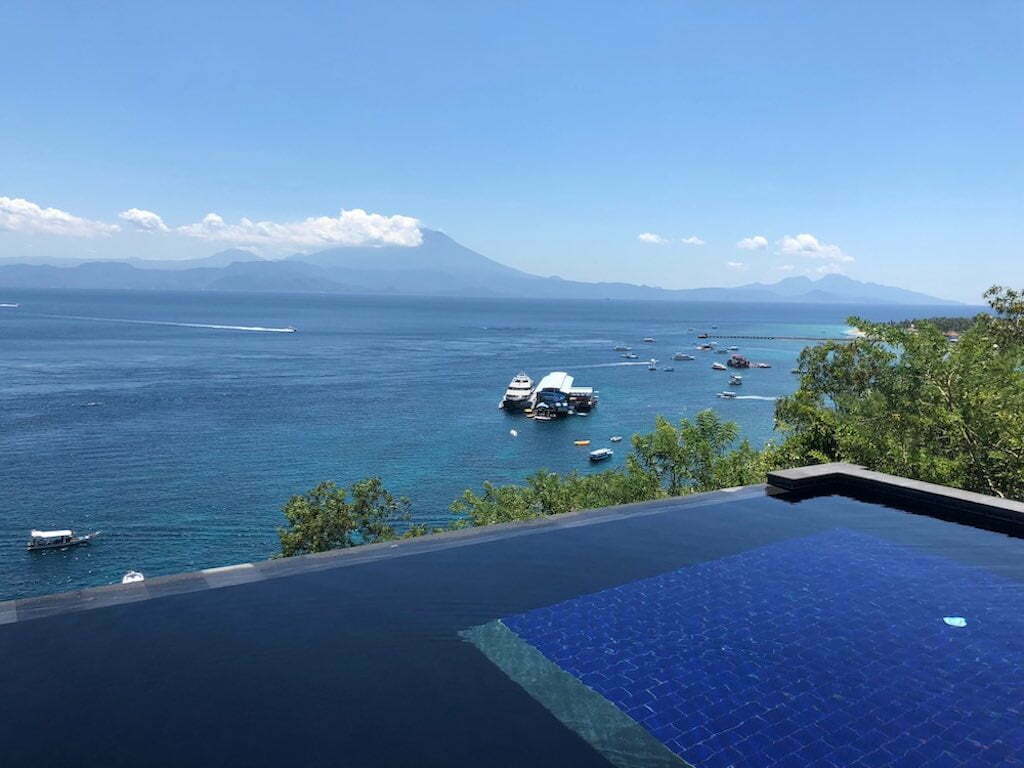
Before the PADI Divemaster Course.
With only a few dives of experience and very limited underwater skills, I had to go scuba diving every day ! Yann is very demanding, but I’m progressing. I chose my favorite dive specialties, and I quickly passed my PADI Advanced Open Water certification. My air consumption during the dives has started to decrease thanks to the good advice of Yann and Célia (the second instructor). I practice daily exercises to improve my buoyancy and the results are visible ! Once ready, Yann makes me take the Emergency First Response (EFR) course that he teaches himself!
Then follows my PADI Rescue Diver course ! These two courses were extremely important in the sense that they teach us how to react in case of emergency ! I really enjoyed these courses because although they deal with very serious subjects, they are dispensed in a fun way. So I dived and learned for a month with Warnakali to reach 40 dives and to finally start my Divemaster training ! Despite the fact that Yann told me that I was in “fun dive”, I imposed myself a certain rigor by applying the practices of my mentor. What I advise you to do from the beginning!
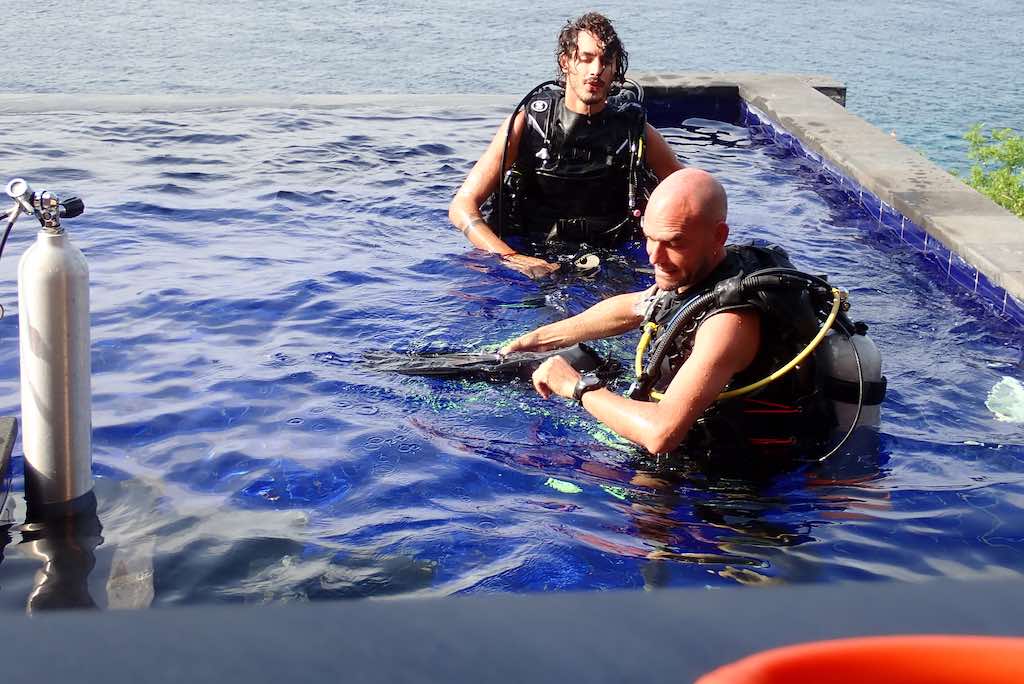
How do you become a certified divemaster ?
The PADI Divemaster course is not only centered around scuba diving, far from it ! You will learn that exemplary behavior is expected from a Divemaster, which implies an irreproachable behavior, a customer-centered approach, etc … A striking example of the expected behavior of a divemaster is the following. I used to stay shirtless in the center. Yann quickly explained to me that this was not correct towards the customers of the dive center.
When you follow a Divemaster training, you also have to show some investment ! Indeed, why would your mentor commit (because he takes the final decision to certify your skills) by signing off your “Divemaster” if you are not fully invested in your training ? Show interest, explore topics that need to be clarified with your mentor ! He will be delighted to see your involvement.
The PADI Divemaster Theory.
To reach the Divemaster level, a certain level of theoretical knowledge about scuba diving is required. The PADI Divemaster manual will be your best friend for completing the various knowledge reviews. At the end of these, you participate in two days of theory in the classroom where everything will be repeated, explained and deepened. This indoor session has allowed me to understand many things. Apart from the fact that we are in a classroom, it is a very convivial moment with your mentor. This course is an exchange and not a long monologue as you can have some at the university or at school ! At the end of this session you pass the theoretical exam and then you are done with the theory. Some people find this part less interesting because they do not dive. This is for me the moments that I have preferred because they allow to significantly enrich our knowledge of scuba diving.
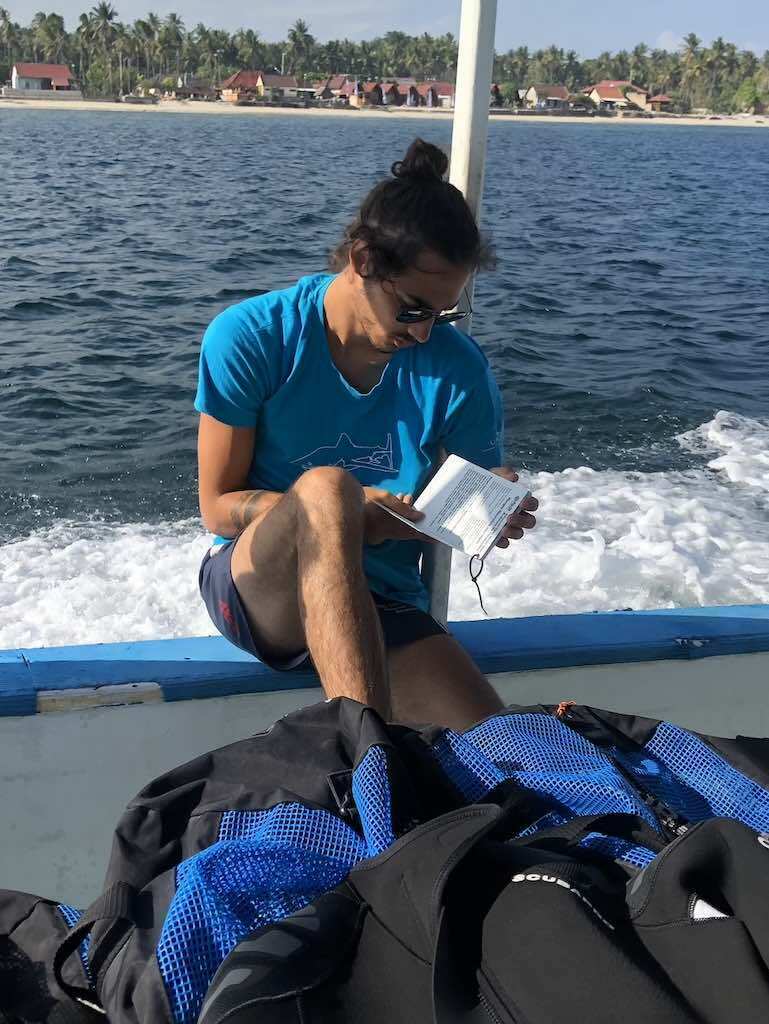
Divemaster Training Skills
During your training you learn to demonstrate the 20 exercises that an Open Water Diver must accomplish and the 4 exercises related to skin diving. To do this, you can watch videos summarizing these skills. The equipment and the pool are available when you want to exercise on top of the courses already provided by the instructors. So you have to work these skills independently or with your partner. One of the elements helping to master these demonstrations is to make them on the ground, in front of a window. It’s the repetition that allow you to master these skills to the point of demonstrating them. Your mentor will then test your ability to perform them.
The different exercises that you will have to practice
During your PADI Divemaster Training, you need to complete several exercises.
You first make an emergency plan for a given diving site. The realization of it will allow you to check your ability to manage an emergency situation.
A second exercise is the mapping of a diving site. You draw the different contours, identify the singular points etc … of a site that you do not know yet ! Indeed, a certain accuracy is expected for this map.
The management of a full day with guests is another exercise! From the arrival of clients to the beach, through the pre-dive briefing, guiding guests underwater and even post-dive debriefing will be evaluated by your instructor. The occasion to show your professionalism and your readiness to answer the questions of the divers !
Another exercise is to build a scenario of research and recovery. For my divemaster training, we went to recover a fishing net hampered in the corals. It was a great experience and it allowed me to discover an entirely different aspect of diving: it’s not just watching the fauna and flora!
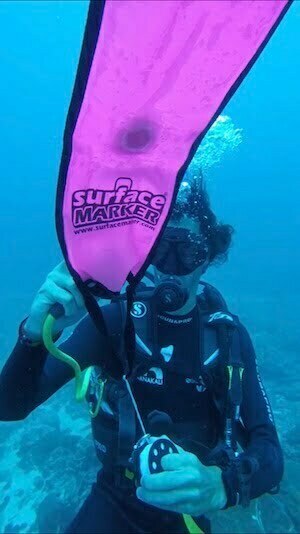
PADI Divemaster Training Swimming Exercises
During your DMT you will be evaluated on different swimming exercises. These usually take place on a full afternoon which allows some time to rest between each event. You start with a 400m freestyle and then continue on a 800m palm-mask-snorkel. These exercises are considered the hardest, that’s why they are done first. You continue with 15 minutes of positive surface buoyancy and 100m of towing a diver. Finally, you end up with a “stress test”, the purpose of which is to put the student in a new context where he will have to deal with different situations. This is the exercise I preferred, it allowed me to learn how to better manage an unknown situation.
Assisting with Discover Scuba Diving and leading Discover Local Diving programs
As a DiveMaster, your role is to lead and assist diving programs. The first of these programs is the Re-Activate. It consists of refreshing the knowledge of already certified divers. After assessing their theoretical knowledge , tou help them to perform practical exercises. You may also conduct snorkeling courses and supervise snorkeling in natural or protected areas. It is essential to remain vigilant about the current and to remind them of the different techniques of apnea if necessary.
You will assist an instructor during discovery dives in natural environment. Exemplarity at all times is key to inspire the students. It is as well important to anticipate the needs of the instructor to simplify his work. Finally you will lead a Discover Local Diving program. In other words a “fun dive” with certified divers. The task is to welcome these divers, carry out the boat briefing and pre-dive briefings and guide them under water. This program is the essence of the work of a graduate Divemaster.
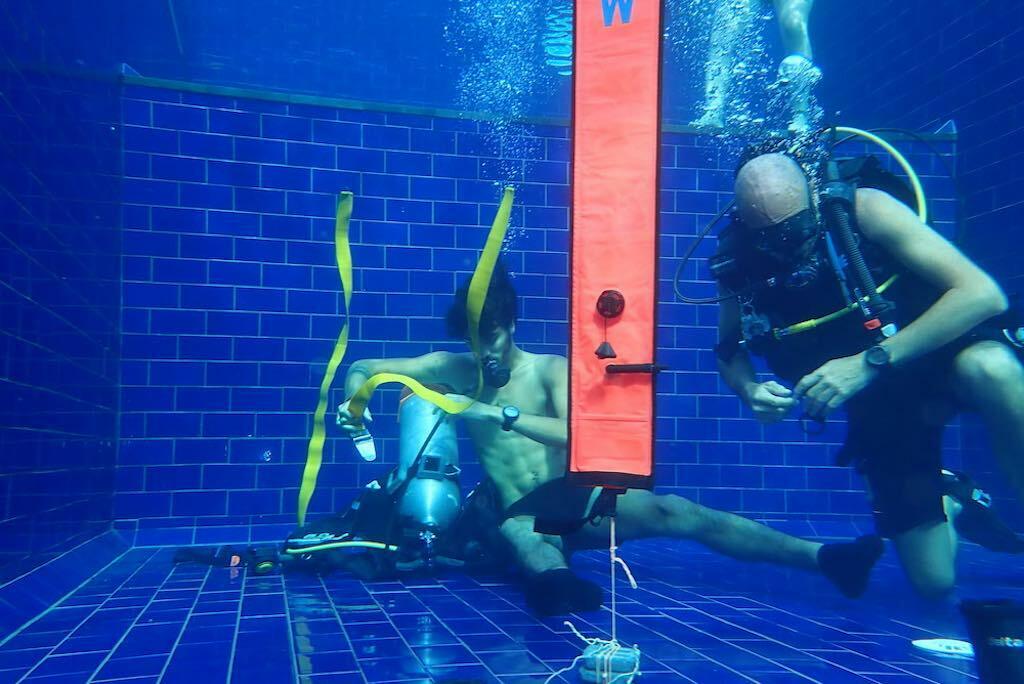
My personal feedback on PADI Divemaster Course
During your training, your motivation is of the essence. Your instructors will allow you to move forward but you have to earn your divemaster certification. Your desire must be clearly visible ! It was not my case at first and the situation was not perfect. After a few discussions with my mentor, the situation evolved and allowed us both to take better advantage of the situation. The sharing becomes obvious and the past moments brilliant. The DMT taught me a lot. Indeed, the relations with the divers are very interesting and allow us a continuous questioning in order to evolve. Humility is also something very important under water, so you will have to learn to be, if it is not already the case. For me, it was complicated because I did not necessarily realize my mistakes.
The Divemaster, first professional level
I would also like to remind you that the DMT can not be bought. At least not with Dune Penida dive center ! Indeed, you have to reach the minima required to be certified. As the Divemaster certification is the first professional diving level at PADI, you need to reach a minimum level and be able to take on some responsibilities. It is by working that you reach the required level. Do not see the DMT as some kind of vacation but more like an apprenticeship. That was my initial mistake and it compromised it at first. Keep in mind that you will make mistakes but that your mentor will in no way be resentful if you understand and correct these mistakes.
Finally, I wish you, future Divemaster Trainee, a lot of success and a bright future in the diving family !
